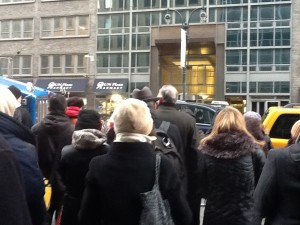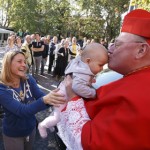I’ve had the late Bernard Nathanson on my mind all day. Perhaps because I started my day at St. Patrick’s Cathedral, where his funeral Mass was held. In his book, The Hand of God, about his conversion from a leading practitioner of abortion — a founder of NARAL — he wrote:
As I look back across the twenty-five years separating me from that revolting extravaganza playing itself out on the bodies of pregnant women and their slaughtered babies, I am struck by the uncritical nature of the task we had set for ourselves, by the moral and spiritual vacuum at the core of this fantastic operation, by our unquestioned certainty of the high level of moral rectitude on which we operated. And yet, the thing was so obviously sordid. Why couldn’t we make the link between the ethical and the moral, between the shoddy practices and shabby practitioners, the evident greed and callous motives, between the crassness of the enterprise and those involved in it, between all these ethical indicators and the grotesque immorality of the act itself?
At his funeral, Fr. Gerard Murray preached:
Dr. Nathanson reminds me of another great witness against evil and in favor of the truth in the twentieth century, Whittaker Chambers. I read somewhere that Betty Friedan thought the same thing, but I am sure for different reasons.
Chambers renounced his membership in the Communist party and spoke out against those who were part of a conspiracy to harm our nation through espionage for the Soviet Union. He confessed to being a Soviet spy. He was vilified. He suffered. He stood firm. He spoke the truth.
The introduction to his book Witness is a “Foreword in the Form of a Letter to My Children.” This quotation from the foreword captures Dr. Nathanson’s courageous witness on behalf of innocent human beings menaced by abortion: “A man is not primarily a witness againstsomething. That is only incidental to the fact that he is a witness for something. A witness, in the sense that I am using the word, is a man whose life and faith are so completely one that when the challenge comes to step out and testify for his faith, he does so, disregarding all risks, accepting all consequences.” (p. 5)
Dr. Bernard Nathanson was a fearless advocate of the self-evident truth that it is a grave injustice to kill people before they are born. The unjust decisions of the United States Supreme Court in Roe v. Wade and Doe v. Bolton mandating legalized abortion in our country cry out for the counter-witness of those who will not abide this injustice. Heroism is called for. True heroism is never easy and is only possible through God’s grace. We acknowledge today our gratitude to a true hero who would not abide such grave injustice in our land. In doing so, we too recognize the Hand of God in the life of Dr. Nathanson.
Chambers wrote of himself in that foreword to his book: “But a man may also be an involuntary witness. I do not know any way to explain why God’s grace touches a man who seems unworthy of it. But neither do I know any other way to explain how a man like myself – tarnished by life, unprepossessing, not brave – could prevail so far against the powers of the world arrayed almost solidly against him, to destroy him and defeat his truth. In this sense, I am an involuntary witness to God’s grace and to the fortifying power of faith.” (p. 6)
Only God knows whether Dr. Nathanson was a voluntary or involuntary witness against abortion and for life. But it is clear that he was truly courageous. He rejected what he knew to be evil, and then spoke out. In his humility he, like Chambers, recognized that God’s grace is made ever more manifest when He chooses unexpected apostles.
Chambers tells a haunting story in his book which gives us, I think, an insight into Dr. Nathanson’s rejection of abortion. He writes: “The daughter of a former German diplomat in Moscow was trying to explain to me why her father, who, as an enlightened modern man had been extremely pro-Communist, had become an implacable anti-Communist. But she loved her father and the irrationality of his defection embarrassed her. ‘He was immensely pro-Soviet,’ she said, ‘and then –you will laugh at me – but you must not laugh at my father – and then- one night – in Moscow he heard screams. That’s all. Simply one night he heard screams.’
“A child of Reason and the 20th century, she knew that there is a logic of the mind. She did not know that the soul has a logic that may be more compelling than the mind’s. She did not know at all that she had swept away the logic of the mind, the logic of history, the logic of politics, the myth of the 20th century, with five annihilating words: one night he heard screams.”(pp. 13-14)
The scream Dr. Nathanson heard was a silent scream. A silent scream uttered by an unseen victim; that is, until the ultrasound machine brought the truth of abortion into plain view for this medical doctor who had expended great effort to make this horror legal and widespread in America. That doctor thereafter boldly decided to make the reality of human life in the womb visible for the whole world to see. Dr. Nathanson wrote in his book: “By 1984, however, I had begun to ask myself more questions about abortion: What actually goes on in an abortion? … so in 1984 I said to a friend of mine, who was doing fifteen or maybe twenty abortions a day, ‘Look, do me a favor, Jay. Next Saturday, when you are doing all these abortions, put an ultrasound device on the mother and tape it for me.’ He did, and when he looked at the tapes with me in an editing studio, he was so affected that he never did another abortion. I, though I had not done an abortion in five years, was shaken to the very roots of my soul by what I saw.” (pp. 140-141)
Anyone who has seen The Silent Scream is shaken. Seeing the truth about abortion overthrows the lies and deceptions of the abortion lobby. An important way that we can honor the memory of Dr. Bernard Nathanson is to continue his work of making the truth known to anyone who is willing to listen to our message, and then to discover what pregnancy really is by looking at ultrasound images of a pre-born human being.
The psalmist tells us: “Cast your burden on the Lord and he will sustain you.” (Ps 55:22) For the past two years it was my privilege to bring the consolation of the sacraments to Dr. Nathanson at his home. His devout reception of the Holy Eucharist revealed to me a man truly in love with Jesus Christ. The Lord indeed was sustaining his son who had cast his heavy burden of past evils on the Lord. “Come to me, all you who labor and are burdened and I will give you rest” (Mt 11:15-16) says the Lord in today’s Gospel. The rest, the peace of soul that Christ gives begins in this life and passes through the Cross and then into eternity. All the while God guides and strengthens us, if only we let him.
Whittaker Chambers ended his Letter to My Children in this way: “My children, when you were little, we used sometimes to go for walks in our pine woods. In the open fields, you would run along by yourselves. But you used instinctively to give me your hands as we entered those woods, where it was darker, lonelier, and in the stillness our voices sounded loud and frightening. In this book I am again giving you my hands. I am leading you, not through cool pine woods, but up and up a narrow defile between bare and steep rocks from which in shadow things uncoil and slither away. It will be dark. But, in the end, if I have led you aright, you will make out three crosses, from two of which hang thieves. I will have brought you to Golgotha – the place of skulls. This is the meaning of the journey. Before you understand, I may not be there, my hands may have slipped away from yours. It will not matter. For when you understand what you see, you will no longer be children. You will know that life is pain, that each of us hangs upon the cross of himself. And when you know that this is true of every man, woman and child on earth, you will be wise. Your Father.”
Our life indeed is meant to be lived in intimate union with the crucified Lord. Golgotha, Calvary is indeed the place where we learn to be wise. The pain we experience, if united to Christ’s pain, is then understood to be a blessing that opens our hearts to the only Love that can take away that pain. That Love is Christ, and the gift of eternal life wipes away all pain and suffering. To live and to die in hopeful expectation of that redemption is God’s great gift to us fallen creatures here below. That gift was joyfully received by Dr. Nathanson in this very Cathedral 14 years ago.

A priest today referred to the clinic where we would process to as a “modern day Calvary.” It is a reminder that the Incarnation Christians celebrate at Christmas has some glorious implications. Ones we ought to take seriously. Beyond buying gifts.











